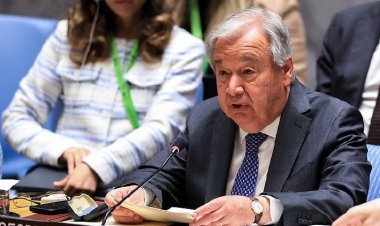Trump's group considers rapid reversal of Biden's "student debt relief" initiative
The proposed action represents the culmination of almost four years of efforts by GOP lawmakers and attorneys general to challenge Biden’s student debt relief policies.

President-elect Donald Trump is set to dismantle President Joe Biden’s extensive efforts to cancel student debt for millions, as Republicans prepare to assume power in the coming months.
Trump’s transition team and external allies have been brainstorming strategies to swiftly reverse various Biden-era initiatives that have provided new avenues for loan forgiveness, as reported by two individuals familiar with the discussions.
This shift marks the peak of nearly four years of Republican opposition to Biden’s student debt relief policies. During his campaign, Trump criticized the loan forgiveness efforts, which amount to hundreds of billions of dollars, labeling them “vile” and illegal. However, his team faces significant challenges: recent court rulings have left the federal government's $1.6 trillion student loan system in chaos, with many borrowers left uncertain about their status.
Trump has selected Linda McMahon, former head of the Small Business Administration, as his nominee for Education Secretary. McMahon has been co-leading the transition and chairs the America First Policy Institute, a group preparing for a potential second term. This organization has denounced Biden’s loan policies as “unlawful, counterproductive, and deeply unfair.”
Jonathan Pidluzny, who oversees higher education issues at AFPI, is involved in handling student loan and education matters for the transition team, according to sources familiar with the process.
“It’s going to be insanely complicated,” remarked Michael Brickman, a former senior Education Department official under Trump. “You really can’t overstate the mess that this new administration is inheriting.”
A federal judge has recently blocked Biden’s attempt at mass debt cancellation after the Supreme Court rejected the administration's initial plan last year. Federal appeals courts have also put a stop to Biden's loan repayment program, which aimed to lower monthly payments, leading to confusion for millions of borrowers. The Trump administration will need to determine how to resume collection of defaulted student debt, which has been on hold since the onset of the pandemic.
Brickman, currently an adjunct fellow at the American Enterprise Institute, commented on the “chaotic situation” left by the Biden administration’s “misadventures around loan forgiveness,” which faced repeated setbacks in court.
While dismantling some of Biden’s wider debt cancellation projects may be straightforward, undoing other programs that impact millions may prove more complex. The Trump team is expected to act swiftly to cease defending certain policies in court, which are already facing legal challenges from Republican attorneys general.
Quadratic issues are anticipated regarding Biden's notable loan repayment initiative, dubbed the SAVE plan. This program, finalized last year, caps monthly payments at 5 percent of income for undergraduate borrowers, provides more generous interest subsidies, and allows for loan forgiveness in as little as ten years for some borrowers. Critics argue that it functions as a costly backdoor to widespread loan forgiveness.
Approximately 8 million borrowers were enrolled when judges halted the program earlier this fall. Following these court orders, the Education Department has paused monthly payments for those benefiting from the initiative. However, shifting these borrowers back to previous, less favorable repayment structures involves both legal and procedural complications.
Trump’s transition team has been exploring methods to withdraw the SAVE plan while also seeking alternative repayment options for borrowers.
“The American people re-elected President Trump by a resounding margin giving him a mandate to implement the promises he made on the campaign trail,” asserted Karoline Leavitt, a spokesperson for the Trump-Vance transition. “He will deliver.”
Loan servicers that manage federal student loans are preparing for potential changes under the new administration but acknowledge that a significant overhaul of the federal student loan system would require time to implement.
Scott Buchanan, head of the Student Loan Servicing Alliance, a trade group for loan servicers, explained that the technical work needed to dismantle the Biden-era SAVE program and recalibrate millions of borrower payments under a new system could take months.
“It certainly wouldn't be an overnight sort of reversal,” Buchanan noted. “It's not a simple fix if that's where the next administration goes.”
Additionally, the Trump administration will need to decide the timing for resuming collections on defaulted federal student debt, which has been on hold since the start of the pandemic.
Leading up to the election, the Biden administration announced it would postpone garnishing wages, tax refunds, and Social Security benefits of nearly 6 million defaulted borrowers until 2025, though specific mechanics of this plan remain unclear.
Despite facing legal challenges, the Biden administration has provided forgiveness to nearly 5 million borrowers, amounting to over $175 billion — more than any other administration. Much of this forgiveness stems from the Education Department's expansions of existing relief programs aimed at assisting targeted borrower groups, including public service workers and individuals defrauded by their schools.
“President Biden has worked to fix the student loan system, make college more affordable, and give Americans a bit more breathing room since he came into office,” stated White House spokesperson Angelo Fernández Hernández. “Republican elected officials have repeatedly attempted to block their own constituents from getting lower payments and receiving the relief they are eligible for.”
Throughout his campaign, Trump often criticized Biden and Vice President Kamala Harris for their failure to fulfill broad student debt relief promises, calling the situation a “total catastrophe.”
Beyond reversing Biden’s student loan measures, Trump’s plans for student loans in a second term remain uncertain.
During his first term, he proposed an income-driven repayment program for borrowers, capping payments at 12.5 percent of income and discharging remaining balances after 15 years of repayment. He also signed an executive order to forgive student debt for severely disabled veterans.
Additionally, when Congress did not extend the pandemic pause on student loan payments in August 2020, Trump used executive action to extend the moratorium, paving the way for the Biden administration to prolong the policy for an additional 2½ years.
Any major reform of federal student loans is likely to stem from Congress.
For years, Republicans in Congress have considered legislation to streamline and reduce certain benefits of the federal student loan program and enable private lenders to compete more effectively with federal loans. Proposals have also included capping federal student loans for graduate school, one of the fastest-growing borrower categories, and measures to hold colleges and universities accountable for federal student loans that former students default on.
A. Wayne Johnson, who led the federal student loan program during Trump’s first administration, has supported some student debt relief for borrowers engaged in national service. However, he has criticized what he views as the “weaponization” of student loan policy under Biden, claiming it canceled student loans based on “invented reasoning.”
"The Trump administration understands the difficulty with which students and families are having to deal with this incredible amount of debt that’s been placed on their backs,” Johnson, a former Republican congressional candidate in Georgia, said. ”The question is: What is the appropriate policy? It’s not all about debt cancellation.”
Rebecca Carballo contributed to this report.
Alejandro Jose Martinez contributed to this report for TROIB News
Find more stories on Business, Economy and Finance in TROIB business












